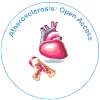Nosso grupo organiza mais de 3.000 Séries de conferências Eventos todos os anos nos EUA, Europa e outros países. Ásia com o apoio de mais 1.000 Sociedades e publica mais de 700 Acesso aberto Periódicos que contém mais de 50.000 personalidades eminentes, cientistas de renome como membros do conselho editorial.
Periódicos de acesso aberto ganhando mais leitores e citações
700 periódicos e 15 milhões de leitores Cada periódico está obtendo mais de 25.000 leitores
Indexado em
- Google Scholar
- RefSeek
- Universidade Hamdard
- EBSCO AZ
- Publons
- ICMJE
Links Úteis
Diários de acesso aberto
Compartilhe esta página
Abstrato
Inflammation and Immunological Responses in Atherosclerosis: Origins and Therapeutic Targets for Innovative Cardiovascular Disease (CVD) Therapies
Glory Coppe
This study focuses on atherosclerosis, a prominent cause of cardiovascular disease (CVD). Atherosclerosis is a chronic inflammatory disorder characterised by immunological competent cells in lesions that primarily generate proinflammatory cytokines. The presence of dead cells and oxidised versions of low density lipoproteins (oxLDL) is significant in this syndrome. The rupture of atherosclerotic plaques is the main cause of CVD. At larger concentrations, oxLDL has features that promote inflammation and immunological activation, causing cell death. It also includes inflammatory phospholipids, notably phosphorylcholine (PC), which is an intriguing epitope. Antibodies that target PC (anti-PC) may have atheroprotective benefits, possibly due to their anti-inflammatory qualities. While the participation of bacteria and viruses in atherosclerosis has been discussed, direct proof has been difficult to come by, and antibiotic studies have failed. Heat shock proteins have the potential to be targets for atherogenic immune responses. Pro-inflammatory cytokines, chemokines, and lipid mediators are other contributors in plaque rupture. To establish inflammation as a cause of atherosclerosis and CVD, clinical trials using anti-inflammatory and immune-modulatory therapy are required. This review investigates the possible origins of immunological responses and inflammation in atherosclerosis, as well as therapeutic techniques that target inflammation for innovative CVD therapies.
Diários por Assunto
- Agro e Aquicultura
- Alimentação e Nutrição
- Bioquímica
- Ciência da Computação
- Ciência de materiais
- Ciencias ambientais
- Ciências Clínicas
- Ciências Farmacêuticas
- Ciências gerais
- Ciências Médicas
- Ciências Sociais e Políticas
- Ciências veterinarias
- Economia e Contabilidade
- Enfermagem e cuidados de saúde
- Engenharia
- Engenheiro químico
- Física
- Genética e Biologia Molecular
- Geologia e Ciências da Terra
- Gestão de negócios
- Imunologia e Microbiologia
- Informática
- Matemática
- Química
Revistas clínicas e médicas
- Anestesiologia
- Assistência médica
- Biologia molecular
- Cardiologia
- Cirurgia
- Dermatologia
- Diabetes e Endocrinologia
- Doenças infecciosas
- Enfermagem
- Fisioterapia e Reabilitação
- Gastroenterologia
- Genética
- Hematologia
- Imunologia
- Medicamento
- Medicina Reprodutiva
- Microbiologia
- Nefrologia
- Neurologia
- Odontologia
- Oftalmologia
- Oncologia
- Ortopedia
- Pediatria
- Pesquisa Clinica
- Pneumologia
- Psiquiatria
- Toxicologia

 English
English  Spanish
Spanish  Chinese
Chinese  Russian
Russian  German
German  French
French  Japanese
Japanese  Hindi
Hindi